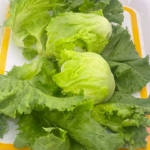
Lettuce often gets overlooked as just another leafy green tossed into salads. But when it grows in your own backyard, it becomes something far more valuable – a symbol of health, sustainability, and the quiet joy of gardening. Even when it overgrows and forms whorls, like mine did this season, it tells a story worth sharing.
The Health Benefits of Lettuce
Lettuce is more than a crunchy leafy green vegetable. It is a nutrient-packed powerhouse that supports overall wellness:
- Vitamin-Rich: Loaded with vitamins A, C, and K, plus folate. These nutrients support eye health, immunity, bone strength, and cell repair.
- Hydration Hero: With about 95% water content, lettuce helps keep you hydrated naturally.
- Antioxidant Protection: Compounds like beta-carotene fight oxidative stress and inflammation.
- Digestive Support: Its fibre content promotes gut health and smooth digestion.
- Weight-Friendly: Low in calories, making it perfect for weight management.
Now Let’s Compare Nutritional Value of Young Leaves Versus Mature Leaves I got interested in comparing the nutritional value of lettuce leaves since my lettuce overgrew this season. I found that young leaves are ideal for fresh salads due to their tenderness and higher vitamin C content, while mature leaves offer more fibre and a stronger flavour and are perfect for stir-fries or wraps. This table explains some more.
| Nutrient | Young Leaves (Baby Lettuce) | Mature Leaves |
| Vitamin A | High | Moderate |
| Vitamin C | Higher | Slightly lower |
| Fiber | Lower | Higher |
| Antioxidants | Rich in polyphenols | Rich in flavonoids |
| Taste & Texture | Tender, mild | Crisp, slightly bitter |
Why a Backyard Garden is a Game-Changer
Growing your own food (at least some of it) can feel so rewarding. Here are some benefits;
- Freshness at Your Fingertips: Harvesting right before a meal means maximum flavor and nutrients.
- Nutrient Density: Homegrown produce retains more vitamins compared to store-bought options that travel long distances.
- Cost Savings: A small garden can significantly cut food bills.
- Built-in Exercise: Gardening keeps you active without feeling like a workout.
- Mental Wellness: Spending time in green spaces—even your backyard—has been linked to reduced stress, improved mood, and better overall mental health.
Some more on The Science Behind Green Spaces and Mental Health
Research has shown that exposure to green spaces, whether in parks, gardens, or even private backyards, has a positive impact on mental wellbeing. A systematic review found that interacting with nature is associated with improved life satisfaction and reduced stress levels, particularly when people feel connected to nature. Another review concluded that green spaces are linked to better hedonic wellbeing (happiness and life satisfaction), even though more research is needed to understand the mechanisms fully. Simply put, your backyard garden is not just feeding your body, it is nourishing your mind.
Final Thoughts
When you grow lettuce in your backyard, it is not just food, it becomes a treasure that nourishes your body, saves you money, and nurtures your soul. So, whether your lettuce is tender and ready for salads or towering in whorls like mine, celebrate and make the best of it.
Click here to join Full Proof Nutrition WhatsApp channel to receive more educative content. Send us a mail on fullproofnutrition@gmail.com
Written by Dr. Laurene Boateng (PhD, RD)
Dr. Laurene Boateng is a Registered Dietitian and Senior Lecturer in the Department of Dietetics, University of Ghana. She is the founder and editor-in-chief of Full Proof Nutrition, a Nutrition Consultancy committed to providing reliable, evidence-based, and practical healthy eating advice through its website www.fullproofnutrition.com. Click here to join Full Proof Nutrition WhatsApp channel to receive more educative content. Send us a mail on fullproofnutrition@gmail.com
References
Shi, M., Gu, J., Wu, H., Rauf, A., Emran, T. B., Khan, Z., Mitra, S., Aljohani, A. S. M., Alhumaydhi, F. A., Al-Awthan, Y. S., Bahattab, O., Thiruvengadam, M., & Suleria, H. A. R. (2022). Phytochemicals, nutrition, metabolism, bioavailability, and health benefits in lettuce—A comprehensive review. Antioxidants, 11(6), 1158. https://doi.org/10.3390/antiox11061158
WebMD Editorial Team. (2024, September 28). Lettuce: Health benefits, nutrients, preparation, and more. WebMD. https://www.webmd.com/diet/health-benefits-lettuce
Wood, C., Wicks, C., & Barton, J. (2023). Green spaces for mental disorders. Current Opinion in Psychiatry, 36(1), 41–46. https://doi.org/10.1097/YCO.0000000000000830